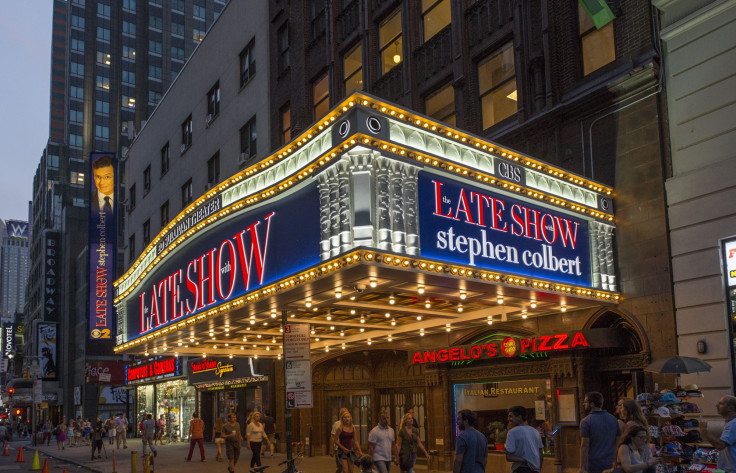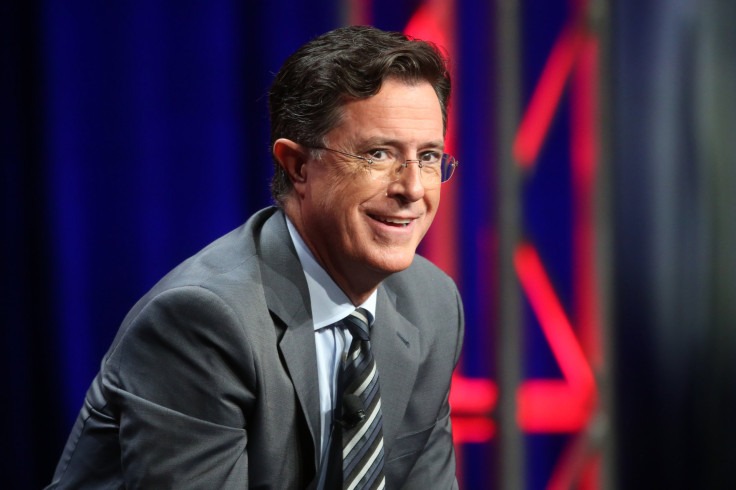Stephen Colbert CBS Debut: A More Political ‘Late Show’ Could Mean A ‘Colbert Bump’ For 2016 Candidates

Jeb Bush hasn’t even walked onto Stephen Colbert’s brand-spanking-new set yet, but the Republican presidential hopeful and his campaign are probably already feeling pretty good about the former Florida governor’s first "Colbert bump."
Thanks to an announcement that he will be one of the first guests on "The Late Show with Stephen Colbert," which premieres Tuesday night on CBS, Bush has finally seen his mentions in the media surpass those of his primary rival, Donald Trump.
According to data from Critical Mention, which monitors discussion of public figures and brands across media, Bush’s mentions on television, radio and digital media have shot up more than 8 percent since being confirmed as one of Colbert’s first guests, passing Trump's mentions for the first time in a month. The other first guests on the new "Late Show," actor George Clooney and entrepreneur Elon Musk, got even bigger Colbert bumps -- their daily mentions shot up more than 20 percent, according to Critical Mention data and analysis.

Thanks to this late-night lift, which will likely grow even larger once the show is up and running, presidential candidates and their handlers are all looking at the prospect of having a key platform to work with. “You can only be on CNN, Fox and MSNBC so many times,” Jim McLaughlin, president of national opinion research firm McLaughlin & Associates, said. “This allows them to show more than one side of themselves.”
Ever since John F. Kennedy used television to edge out Richard Nixon for the White House in 1960, presidential candidates have scoured the mass media landscape for opportunities to get in front of large groups of people, and late-night talk shows have been regarded as one of the best. From Bill Clinton showcasing his saxophone talents, to Arnold Schwarzenegger announcing his gubernatorial candidacy, to President Barack Obama pushing the Affordable Care Act with NBC "Tonight Show" host Jimmy Fallon, late night offers a rich platform for candidates looking to advance an image or agenda.
“It's not a larger audience than 'The Today Show' or the morning news, but it's a different makeup and a different demographic,” Kevin Lawlor, director of press and media at political consultancy DDC, said.
But with Comedy Central's "The Daily Show" in transition from host Jon Stewart to successor Trevor Noah, and late-night hosts Jay Leno and David Letterman having retired, there has been a noticeable lack of couch space for political candidates. In Colbert, whom political scientists proved after the 2008 election season has the ability to give political candidates a shot in the arm, any of the dozen candidates stuck together at the bottom of the polls should see his show as a way to break out.
“It's not a safe play,” said Lawlor, who once worked for congressional campaigns and booked a few candidates as guests on Colbert's previous show, Comedy Central's “The Colbert Report.” “But if taking a risk is something you need to kick-start your campaign, you think about it.”
Resetting The Narrative
One of the reasons late-night television is such an inviting opportunity is because it does not necessarily reach a deeply informed audience. Pew research published in 2012 found that more Americans get presidential campaign news from late-night talk show hosts than they do from national newspapers, giving guests a great chance to make a first impression.
“Many people used to say you have to follow the news to get the joke,” Jane Hall, a professor of journalism who studies politics and the media at American University, said. “I think the audience for these shows, many of them may be getting news too.”

A Gracious Host
But few candidates will venture into hostile territory, no matter how many eyeballs they might find there. Letterman told a lot more jokes about Republicans than Democrats while he was the host of CBS's "Late Show with David Letterman," which was not always seen as a welcome late-night destination. Former "Tonight Show" host Leno was seen as an equal-opportunity offender, but his successor, Jimmy Fallon, appears to have a liberal bent that makes conservatives leery. [Fallon recently booked Democratic presidential front-runner Hillary Clinton to appear on his show Sept. 16, according to the Hollywood Reporter.] Seth Meyers, host of NBC's "Late Night with Seth Meyers," despite a stated interest in politics, has had trouble moving the needle both in terms of ratings and in starting conversations the next day.
To avoid being seen as a liberal bully, Colbert has made a number of moves, some more explicit than others. He has said numerous times that his Comedy Central character was simply that -- a character -- and he has done press around his work teaching Sunday school, a move some observers see as a nod that he will be a good person for moral-heavy candidates. “I think that was a dog whistle to Republicans,” McLaughlin said.
No one can say what kind of treatment Colbert will give his guests, but both sides of the aisle will get it: In addition to Republican Bush, Democratic candidate Sen. Bernie Sanders and Vice President Joe Biden, a possible presidential contender, are also scheduled to appear on upcoming episodes of the program.
A Chance To Stand Out
If Colbert’s "Late Show" does indeed lean heavily on political guests over the next 15 months, the candidates will not be the only ones benefiting. A huge part of Colbert’s cachet rests on his political daring, from insulting President George W. Bush during the White House Correspondents Dinner in 2006 to creating his own Super PAC.
Playing host to candidates will offer Colbert an easy way to keep his name out there the next day. “One of the things that he will do is have more politics and more political figures as a way of differentiating himself from [ABC's] Jimmy Kimmel and Jimmy Fallon,” Hall said. “There's a new generation of talk show hosts, and they're all competing.”
© Copyright IBTimes 2024. All rights reserved.





















